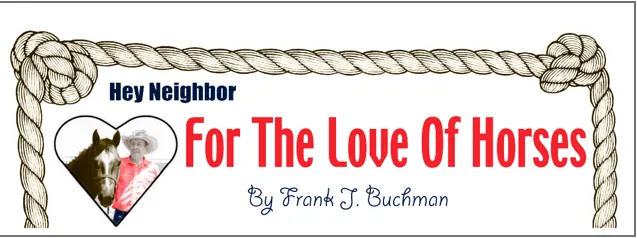By Frank J. Buchman
Nobody likes to get a shot at the doctor’s office.
Horses hate to be given vaccination, too, some worse than others.
Still, it’s better to get a shot than suffer much more severe consequences, be it a person or a horse.
But, just what vaccinations do horses really need?
It’s complicated; such there’s no simple, one response answer.
Likewise, every horse is different, depending on their use, ownership, location and a variety of circumstances planned and incomprehensible, according to veterinarians specializing in equine medicine.
As with much of life, knowledge is complemented by wisdom through lifetime experiences.
Based on combined study and understanding of animal health, care, prevention and treatment, it’d be difficult to find more and better guidance than that of longtime partners Dr. Arnold Nagely and Dr. Ray Schultz, former practicing veterinarians now working-advising, owners-operators of Valley Vet Supply at Marysville.
The good horse doctors, wise men of all animal health, Dr. Nagely and Dr. Schultz, have offered information about general horse ailments which require regular a vaccination program.
Often referred to as “lockjaw”, tetanus is caused by a toxin-producing bacterium that is often found in the soil. It can enter the skin through cuts, wounds or a newborn’s umbilicus.
Symptoms of tetanus include muscle stiffness and rigidity, flared nostrils, prolapsed third eyelid and legs stiff in a sawhorse stance. As the tetanus disease progresses, muscles in the jaw and face stiffen, preventing the animal from eating or drinking. More than 80 percent of affected horses die.
Encephalomyelitis, more commonly known as “sleeping sickness”, is transmitted to horses by mosquitoes that have acquired it from birds and rodents. Eastern (EEE) and Western (WEE) equine encephalomyelitis have been noted in the United States.
Sleeping sickness symptoms vary, but all result from degeneration of the brain. Early signs include fever, depression and loss of appetite. As it progresses, staggering gait and paralysis may develop. Depending upon the strain, between 20 and 100 percent of sleeping sickness infected horses die.
West Nile Virus is transmitted by mosquitoes that have acquired it from birds or other animals. West Nile infects the central nervous system, and presents with symptoms similar to sleeping sickness. Although West Nile has been responsible for equine deaths, most infected horses can achieve full or partial recovery with supportive therapy.
The rabies virus is most often transmitted through contact with the saliva of an infected animal. Rabies affects the central nervous system and leads to cerebral dysfunction, including excess salivation, abnormal behavior and aggression.
Though horses are infected infrequently by rabies, it is always fatal. Rabies can be transmitted from horses to humans.
Two distinct viruses, equine herpesvirus type 1 (EHV-1) and equine herpesvirus type 4 (EHV-4) cause two different diseases, both of which are known as rhinopneumonitis.
Both rhinopneumonitis types cause respiratory problems that may include fever, lethargy, loss of appetite, nasal discharge and coughing. EHV-1 may also cause abortion, foal death, neurological signs and paralysis.
Rhinopneumonitis is spread by aerosol or direct contact with secretions, instruments or drinking water. The rhinopneumonitis virus may not present any symptoms in carrier animals. Immune protection for pregnant mares requires vaccination with EHV-1 vaccine specifically labeled for abortion protection.
One of the most common respiratory diseases in horses, influenza is highly contagious. The virus can be transmitted by aerosol transmission from horse to horse.
Symptoms of influenza are similar to those in a human with a cold, including dry cough, nasal discharge, fever and loss of appetite. Horses that travel or are exposed to other horses are most at risk.
Potomac horse fever is an acute intestinal inflammation s caused by ingestion of bacterial spores that may be found in pastures bordering creeks and rivers. Potomac horse fever symptoms can include mild colic, fever, diarrhea and abortion.
Strangles is a highly contagious, yet rarely fatal, bacterial infection characterized by abscess of the lymphoid tissue of the upper respiratory tract. Strangles is transmitted through contact with infectious excretions and surfaces containing the resilient bacteria.
A two- or three-dose series primary vaccination program is recommended for each of these horse diseases. That should followed by single dose annual or semi-annual vaccinations, depending on label directions.
Broodmares sometimes require additional vaccinations, but caution is essential as to time of vaccination. Foals typically should two- or three-series doses as a primary vaccination program.
Vaccinations should be spread out over a period of time, and season, as well as recorded permanently for reference at all times
Many combination vaccines are available, with protection against multiple diseases, to minimize the number of injections given.
It is essential to read label directions carefully and follow them exactly when giving a horse any type of vaccination.
Additional horse vaccination advice can be obtained from Dr. Nagely and Dr. Schultz at www.valleyvet.com.



